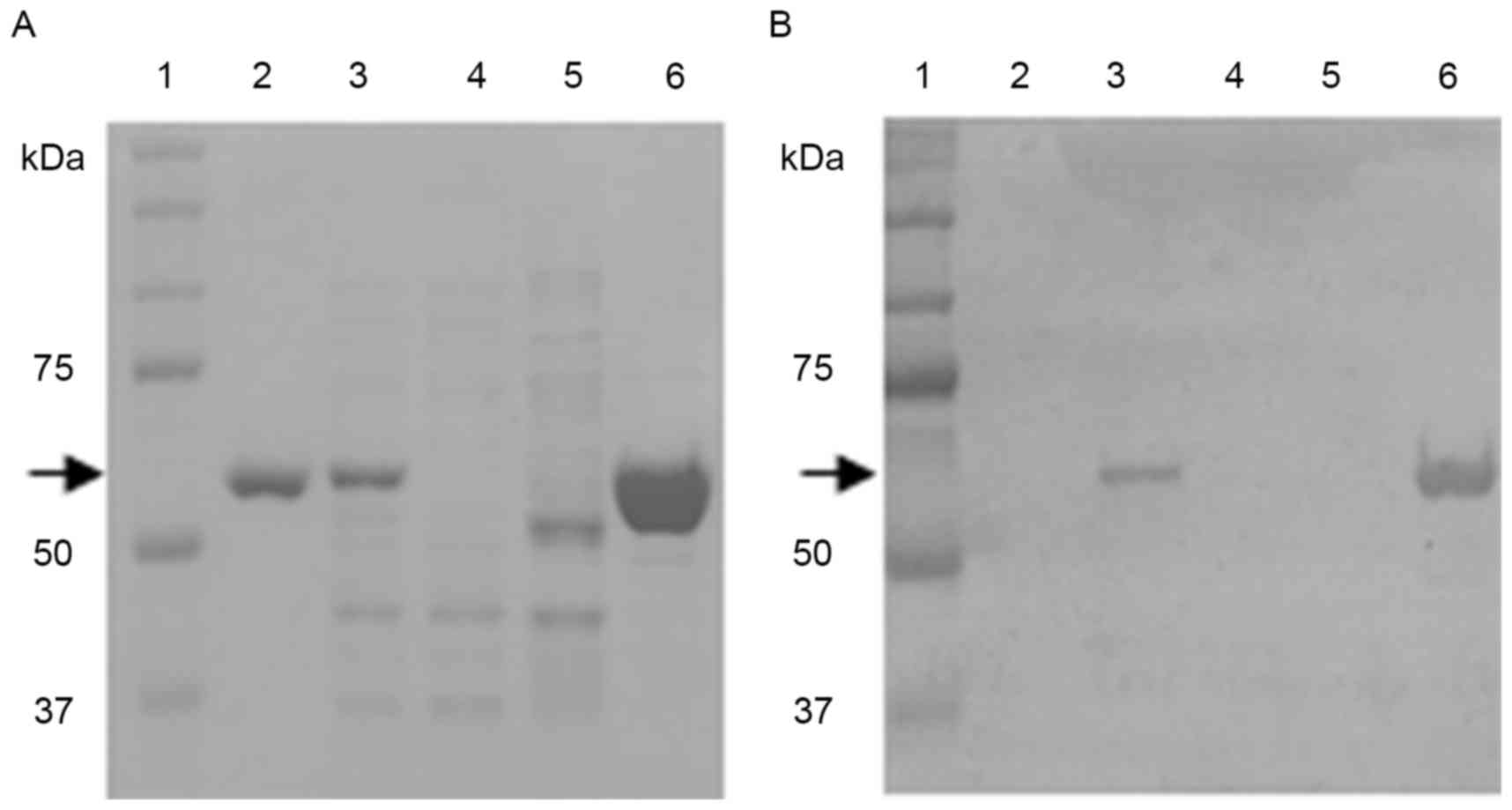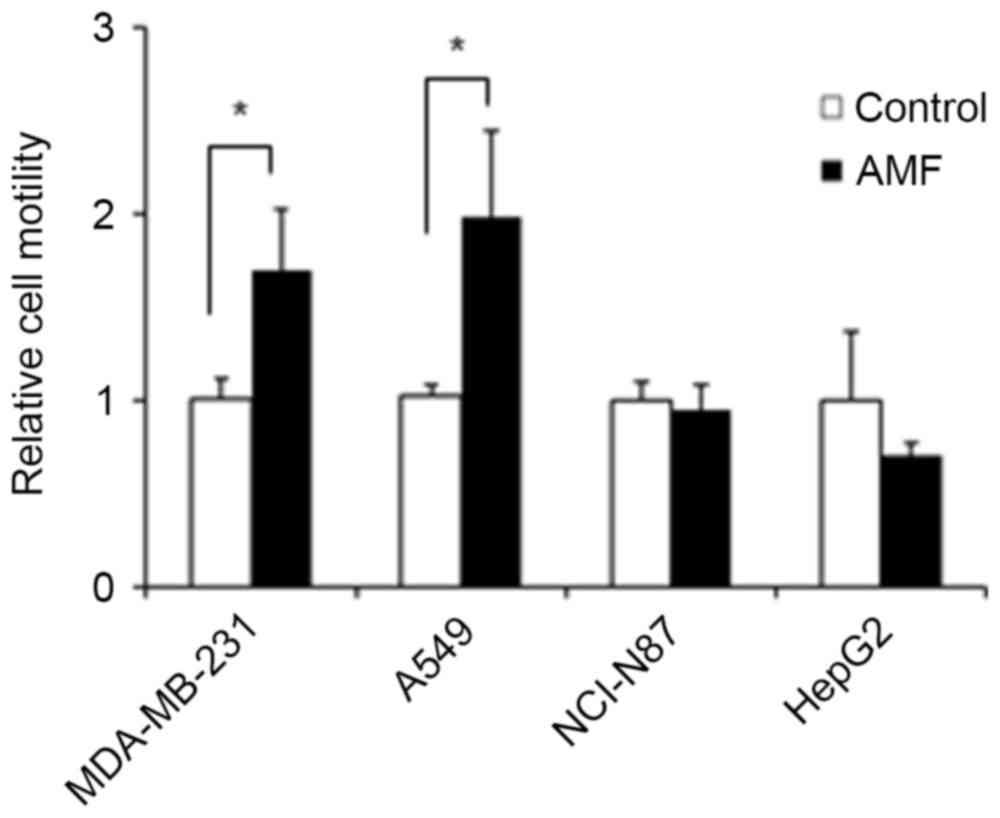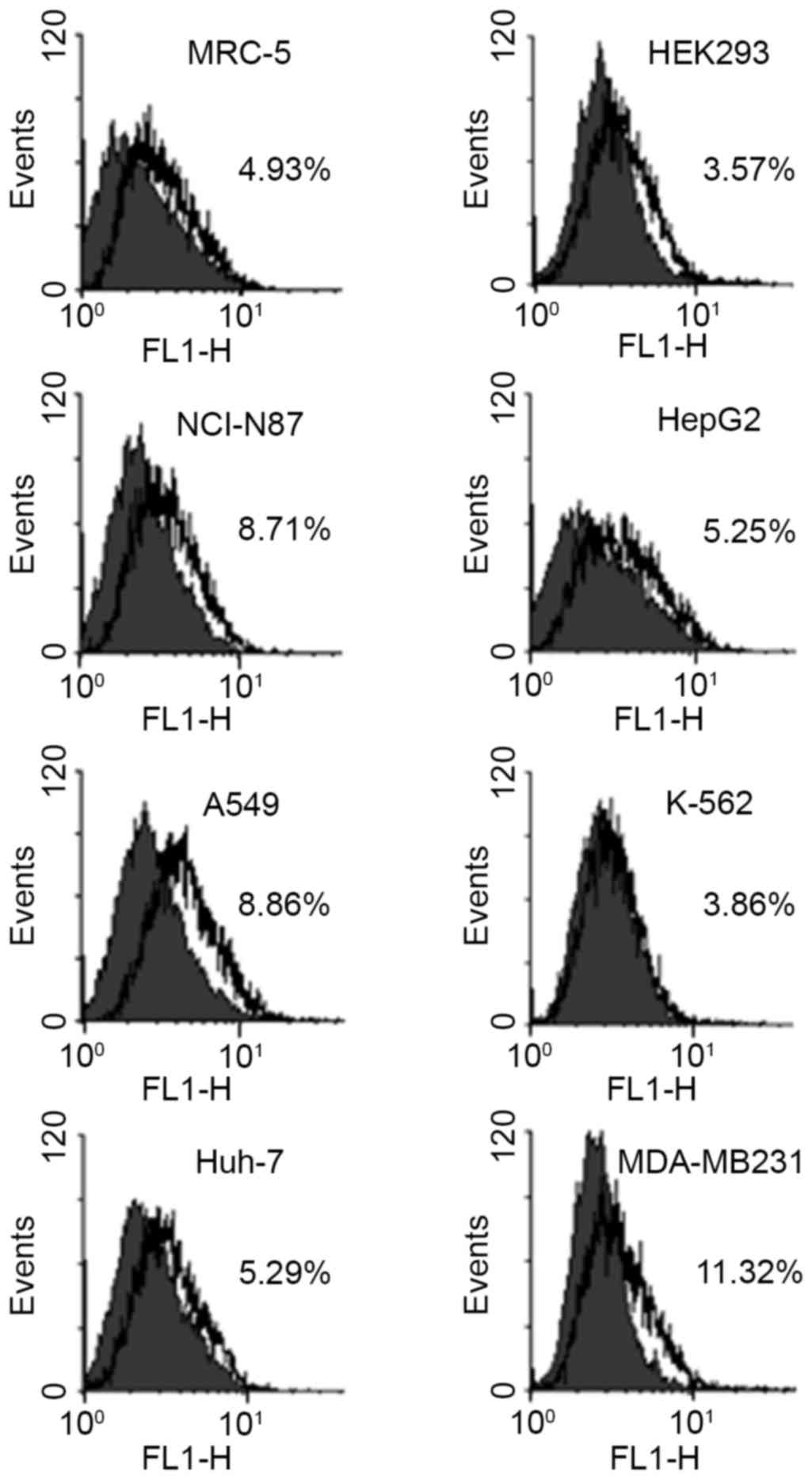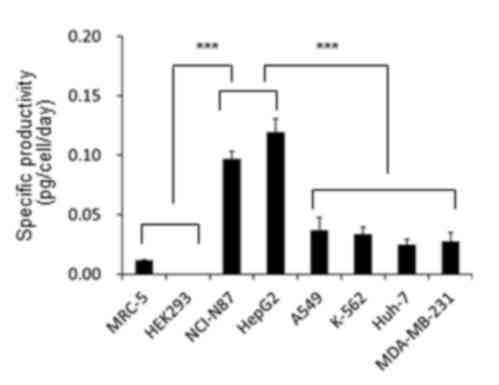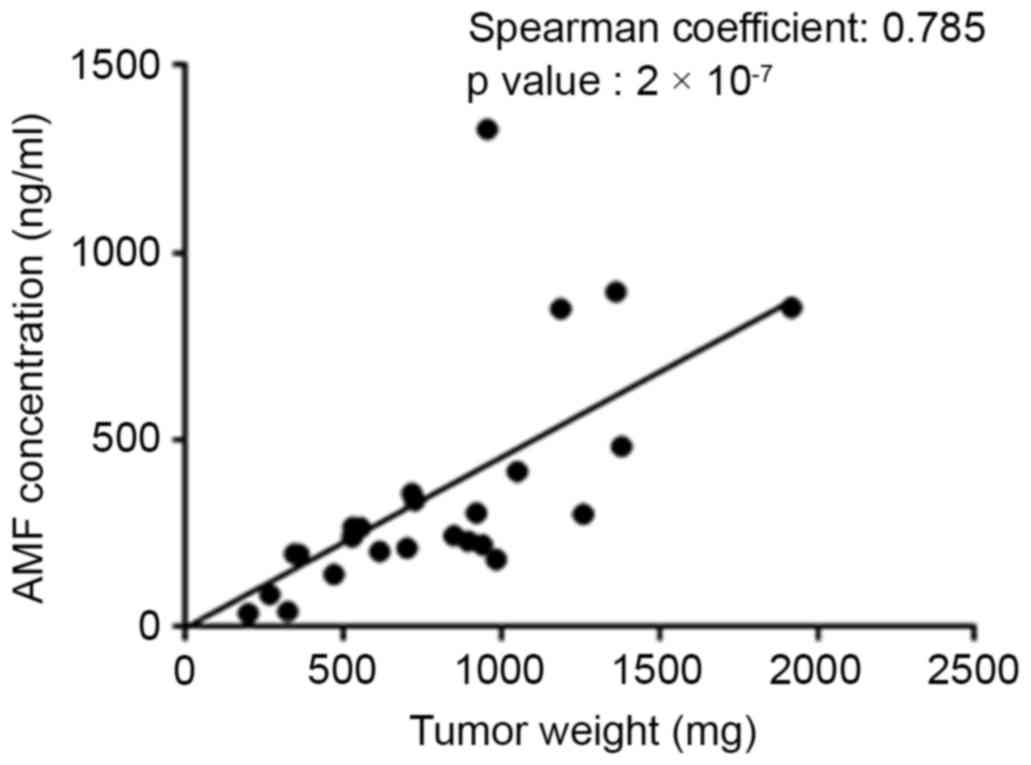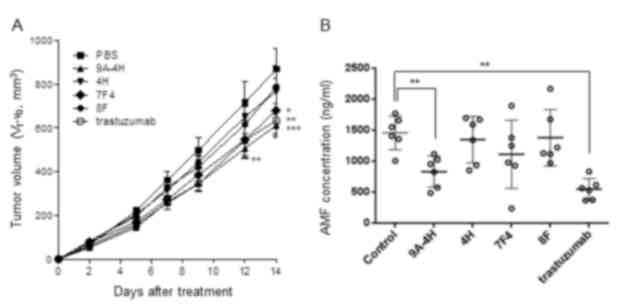|
1
|
Liotta LA, Mandler R, Murano G, Katz DA,
Gordon RK, Chiang PK and Schiffmann E: Tumor cell autocrine
motility factor. Proc Natl Acad Sci USA. 83:pp. 3302–3306. 1986;
View Article : Google Scholar : PubMed/NCBI
|
|
2
|
Gurney ME, Apatoff BR, Spear GT, Baumel
MJ, Antel JP, Bania MB and Reder AT: Neuroleukin: A lymphokine
product of lectin-stimulated T cells. Science. 234:574–581. 1986.
View Article : Google Scholar : PubMed/NCBI
|
|
3
|
Xu W, Seiter K, Feldman E, Ahmed T and
Chiao JW: The differentiation and maturation mediator for human
myeloid leukemia cells shares homology with neuroleukin or
phosphoglucose isomerase. Blood. 87:4502–4506. 1996.PubMed/NCBI
|
|
4
|
Cao MJ, Osatomi K, Matsuda R, Ohkubo M,
Hara K and Ishihara T: Purification of a novel serine proteinase
inhibitor from the skeletal muscle of white croaker (Argyrosomus
argentatus). Biochem Biophys Res Commun. 272:485–489. 2000.
View Article : Google Scholar : PubMed/NCBI
|
|
5
|
Yakirevich E and Naot Y: Cloning of a
glucose phosphate isomerase/neuroleukin-like sperm antigen involved
in sperm agglutination. Biol Reprod. 62:1016–1023. 2000. View Article : Google Scholar : PubMed/NCBI
|
|
6
|
Gomm SA, Keevil BG, Thatcher N, Hasleton
PS and Swindell RS: The value of tumour markers in lung cancer. Br
J Cancer. 58:797–804. 1988. View Article : Google Scholar : PubMed/NCBI
|
|
7
|
Baumann M, Kappl A, Lang T, Brand K,
Siegfried W and Paterok E: The diagnostic validity of the serum
tumor marker phosphohexose isomerase (PHI) in patients with
gastrointestinal, kidney, and breast cancer. Cancer Invest.
8:351–356. 1990. View Article : Google Scholar : PubMed/NCBI
|
|
8
|
Tsutsumi S, Yanagawa T, Shimura T,
Fukumori T, Hogan V, Kuwano H and Raz A: Regulation of cell
proliferation by autocrine motility factor/phosphoglucose isomerase
signaling. J Biol Chem. 278:32165–32172. 2003. View Article : Google Scholar : PubMed/NCBI
|
|
9
|
Tsutsumi S, Hogan V, Nabi IR and Raz A:
Overexpression of the autocrine motility factor/phosphoglucose
isomerase induces transformation and survival of NIH-3T3
fibroblasts. Cancer Res. 63:242–249. 2003.PubMed/NCBI
|
|
10
|
Haga A, Funasaka T, Deyashiki Y and Raz A:
Autocrine motility factor stimulates the invasiveness of malignant
cells as well as up-regulation of matrix metalloproteinase-3
expression via a MAPK pathway. FEBS Lett. 582:1877–1882. 2008.
View Article : Google Scholar : PubMed/NCBI
|
|
11
|
Tsutsumi S, Yanagawa T, Shimura T, Kuwano
H and Raz A: Autocrine motility factor signaling enhances
pancreatic cancer metastasis. Clin Cancer Res. 10:7775–7784. 2004.
View Article : Google Scholar : PubMed/NCBI
|
|
12
|
Funasaka T, Haga A, Raz A and Nagase H:
Tumor autocrine motility factor is an angiogenic factor that
stimulates endothelial cell motility. Biochem Biophys Res Commun.
285:118–128. 2001. View Article : Google Scholar : PubMed/NCBI
|
|
13
|
Silletti S, Watanabe H, Hogan V, Nabi IR
and Raz A: Purification of B16-F1 melanoma autocrine motility
factor and its receptor. Cancer Res. 51:3507–3511. 1991.PubMed/NCBI
|
|
14
|
Kanbe K, Chigira M and Watanabe H: Effects
of protein kinase inhibitors on the cell motility stimulated by
autocrine motility factor. Biochim Biophys Acta. 1222:395–399.
1994. View Article : Google Scholar : PubMed/NCBI
|
|
15
|
Tsutsumi S, Gupta SK, Hogan V, Collard JG
and Raz A: Activation of small GTPase Rho is required for autocrine
motility factor signaling. Cancer Res. 62:4484–4490.
2002.PubMed/NCBI
|
|
16
|
Chiu CG, St-Pierre P, Nabi IR and Wiseman
SM: Autocrine motility factor receptor: A clinical review. Expert
Rev Anticancer Ther. 8:207–217. 2008. View Article : Google Scholar : PubMed/NCBI
|
|
17
|
Kho DH, Zhang T, Balan V, Wang Y, Ha SW,
Xie Y and Raz A: Autocrine motility factor modulates EGF-mediated
invasion signaling. Cancer Res. 74:2229–2237. 2014. View Article : Google Scholar : PubMed/NCBI
|
|
18
|
Funasaka T, Hu H, Yanagawa T, Hogan V and
Raz A: Down-regulation of phosphoglucose isomerase/autocrine
motility factor results in mesenchymal-to-epithelial transition of
human lung fibrosarcoma cells. Cancer Res. 67:4236–4243. 2007.
View Article : Google Scholar : PubMed/NCBI
|
|
19
|
Niinaka Y, Harada K, Fujimuro M, Oda M,
Haga A, Hosoki M, Uzawa N, Arai N, Yamaguchi S, Yamashiro M and Raz
A: Silencing of autocrine motility factor induces
mesenchymal-to-epithelial transition and suppression of
osteosarcoma pulmonary metastasis. Cancer Res. 70:9483–9493. 2010.
View Article : Google Scholar : PubMed/NCBI
|
|
20
|
Li Y, Che Q, Bian Y, Zhou Q, Jiang F, Tong
H, Ke J, Wang K and Wan XP: Autocrine motility factor promotes
epithelial-mesenchymal transition in endometrial cancer via MAPK
signaling pathway. Int J Oncol. 47:1017–1024. 2015.PubMed/NCBI
|
|
21
|
Papaetis GS and Syrigos KN: Sunitinib: A
multitargeted receptor tyrosine kinase inhibitor in the era of
molecular cancer therapies. BioDrugs. 23:377–389. 2009. View Article : Google Scholar : PubMed/NCBI
|
|
22
|
Ciardiello F, de Vita F, Orditura M,
Comunale D and Galizia G: Cetuximab in the treatment of colorectal
cancer. Future Oncol. 1:173–181. 2005. View Article : Google Scholar : PubMed/NCBI
|
|
23
|
Hitt R, Martin P and Hidalgo M: Cetuximab
in squamous cell carcinoma of the head and neck. Future Oncol.
2:449–457. 2006. View Article : Google Scholar : PubMed/NCBI
|
|
24
|
Iqbal N and Iqbal N: Imatinib: A
breakthrough of targeted therapy in cancer. Chemother Res Pract.
2014:3570272014.PubMed/NCBI
|
|
25
|
Braghiroli MI, Sabbaga J and Hoff PM:
Bevacizumab: Overview of the literature. Expert Rev Anticancer
Ther. 12:567–580. 2012. View Article : Google Scholar : PubMed/NCBI
|
|
26
|
Holohan C, van Schaeybroeck S, Longley DB
and Johnston PG: Cancer drug resistance: An evolving paradigm. Nat
Rev Cancer. 13:714–726. 2013. View
Article : Google Scholar : PubMed/NCBI
|
|
27
|
Takanami I, Takeuchi K, Watanabe H,
Yanagawa T, Takagishi K and Raz A: Significance of autocrine
motility factor receptor gene expression as a prognostic factor in
non-small-cell lung cancer. Int J Cancer. 95:384–387. 2001.
View Article : Google Scholar : PubMed/NCBI
|
|
28
|
Ohta Y, Tanaka Y, Hara T, Oda M, Watanabe
S, Shimizu J and Watanabe Y: Clinicopathological and biological
assessment of lung cancers with pleural dissemination. Ann Thorac
Surg. 69:1025–1029. 2000. View Article : Google Scholar : PubMed/NCBI
|
|
29
|
Funasaka T and Raz A: The role of
autocrine motility factor in tumor and tumor microenvironment.
Cancer Metastasis Rev. 26:725–735. 2007. View Article : Google Scholar : PubMed/NCBI
|
|
30
|
Nabi IR, Watanabe H and Raz A:
Identification of B16-F1 melanoma autocrine motility-like factor
receptor. Cancer research. 50:409–414. 1990.PubMed/NCBI
|
|
31
|
Bang YJ, van Cutsem E, Feyereislova A,
Chung HC, Shen L, Sawaki A, Lordick F, Ohtsu A, Omuro Y, Satoh T,
et al: Trastuzumab in combination with chemotherapy versus
chemotherapy alone for treatment of HER2-positive advanced gastric
or gastro-oesophageal junction cancer (ToGA): A phase 3,
open-label, randomised controlled trial. Lancet. 376:687–697. 2010.
View Article : Google Scholar : PubMed/NCBI
|
|
32
|
Kho DH, Nangia-Makker P, Balan V, Hogan V,
Tait L, Wang Y and Raz A: Autocrine motility factor promotes HER2
cleavage and signaling in breast cancer cells. Cancer Res.
73:1411–1419. 2013. View Article : Google Scholar : PubMed/NCBI
|















